达尔文英文介绍
- 格式:ppt
- 大小:1.04 MB
- 文档页数:20
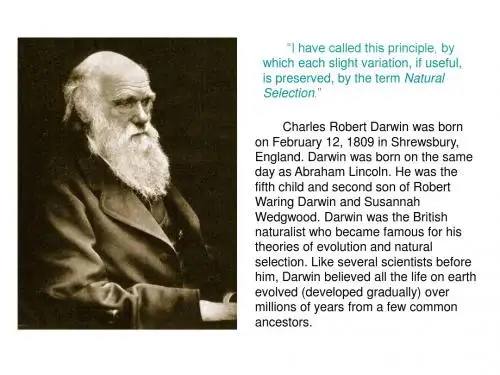
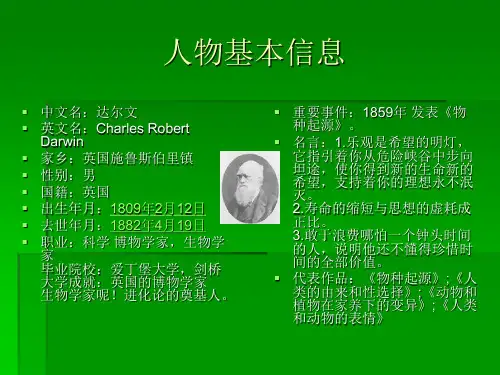
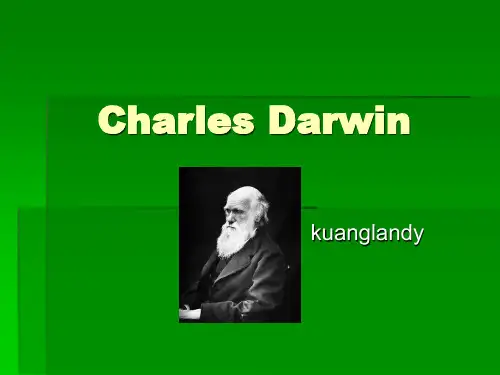
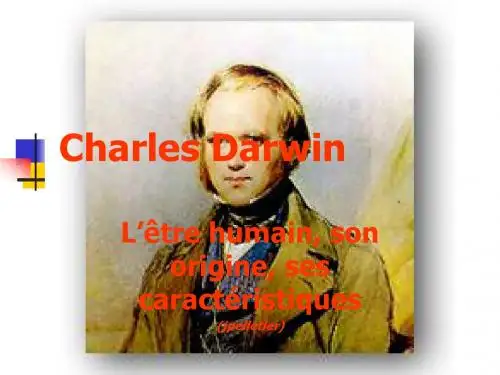
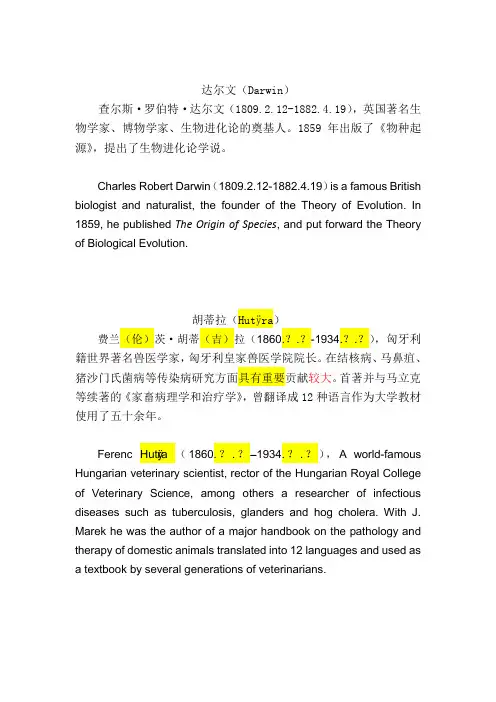
达尔文(Darwin)查尔斯·罗伯特·达尔文(1809.2.12-1882.4.19),英国著名生物学家、博物学家、生物进化论的奠基人。
1859年出版了《物种起源》,提出了生物进化论学说。
Charles Robert Darwin(1809.2.12-1882.4.19)is a famous British biologist and naturalist, the founder of the Theory of Evolution. In 1859, he published The Origin of Species, and put forward the Theory of Biological Evolution.胡蒂拉(Hutÿra)费兰(伦)茨·胡蒂(吉)拉(1860.?.?-1934.?.?),匈牙利籍世界著名兽医学家,匈牙利皇家兽医学院院长。
在结核病、马鼻疽、猪沙门氏菌病等传染病研究方面具有重要贡献较大。
首著并与马立克等续著的《家畜病理学和治疗学》,曾翻译成12种语言作为大学教材使用了五十余年。
Ferenc Hutÿr a(1860.?.?–1934.?.?),A world-famous Hungarian veterinary scientist, rector of the Hungarian Royal College of Veterinary Science, among others a researcher of infectious diseases such as tuberculosis, glanders and hog cholera. With J. Marek he was the author of a major handbook on the pathology and therapy of domestic animals translated into 12 languages and used as a textbook by several generations of veterinarians.。
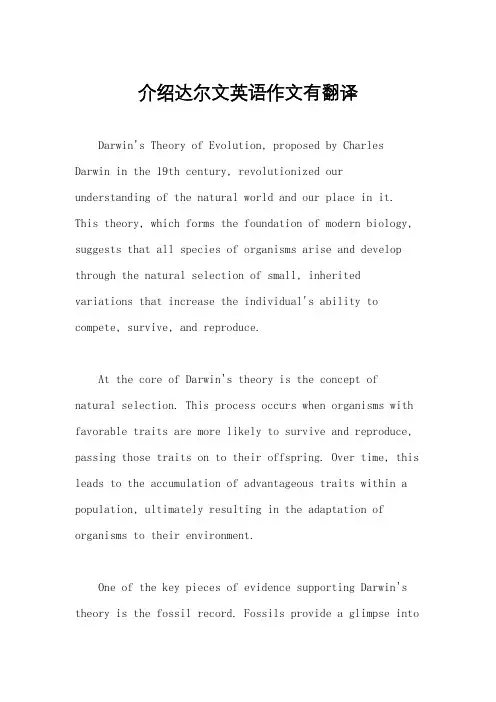
介绍达尔文英语作文有翻译Darwin's Theory of Evolution, proposed by Charles Darwin in the 19th century, revolutionized our understanding of the natural world and our place in it. This theory, which forms the foundation of modern biology, suggests that all species of organisms arise and develop through the natural selection of small, inheritedvariations that increase the individual's ability to compete, survive, and reproduce.At the core of Darwin's theory is the concept of natural selection. This process occurs when organisms with favorable traits are more likely to survive and reproduce, passing those traits on to their offspring. Over time, this leads to the accumulation of advantageous traits within a population, ultimately resulting in the adaptation of organisms to their environment.One of the key pieces of evidence supporting Darwin's theory is the fossil record. Fossils provide a glimpse intothe history of life on Earth, showing how organisms have changed over millions of years. For example, the fossil record clearly demonstrates the evolution of whales from land-dwelling ancestors to the marine mammals we see today.Another line of evidence comes from comparative anatomy. By comparing the anatomical structures of different species, scientists can uncover similarities that suggest a common ancestry. For instance, the similarity in the skeletal structures of humans, bats, and whales indicates that they share a common ancestor, despite their vastly different lifestyles.Furthermore, molecular biology has provided compelling evidence for evolution. DNA analysis allows scientists to compare the genetic code of different organisms, revealing similarities that reflect their evolutionary relationships. This molecular evidence not only supports the idea of common ancestry but also helps scientists trace the evolutionary history of specific traits.While Darwin's theory has faced criticism andrefinement over the years, it remains the cornerstone of modern biology. Its implications extend far beyond the realm of science, influencing our understanding of ourselves and our place in the natural world. By recognizing the interconnectedness of all living things and the processes that have shaped life on Earth, we gain a deeper appreciation for the beauty and complexity of the natural world.达尔文的进化论由19世纪的查尔斯·达尔文提出,彻底改变了我们对自然界及其地位的理解。

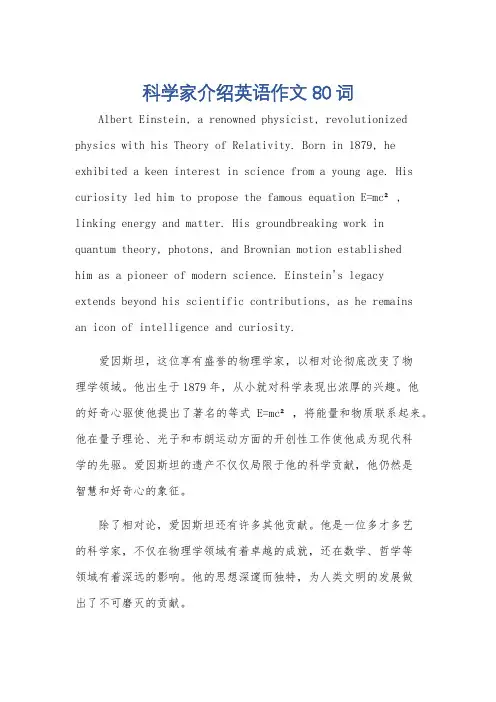
科学家介绍英语作文80词Albert Einstein, a renowned physicist, revolutionized physics with his Theory of Relativity. Born in 1879, he exhibited a keen interest in science from a young age. His curiosity led him to propose the famous equation E=mc², linking energy and matter. His groundbreaking work in quantum theory, photons, and Brownian motion establishedhim as a pioneer of modern science. Einstein's legacy extends beyond his scientific contributions, as he remains an icon of intelligence and curiosity.爱因斯坦,这位享有盛誉的物理学家,以相对论彻底改变了物理学领域。
他出生于1879年,从小就对科学表现出浓厚的兴趣。
他的好奇心驱使他提出了著名的等式E=mc²,将能量和物质联系起来。
他在量子理论、光子和布朗运动方面的开创性工作使他成为现代科学的先驱。
爱因斯坦的遗产不仅仅局限于他的科学贡献,他仍然是智慧和好奇心的象征。
除了相对论,爱因斯坦还有许多其他贡献。
他是一位多才多艺的科学家,不仅在物理学领域有着卓越的成就,还在数学、哲学等领域有着深远的影响。
他的思想深邃而独特,为人类文明的发展做出了不可磨灭的贡献。
爱因斯坦的传奇人生也充满了波折和争议。
他曾遭受纳粹的迫害,被迫离开故乡德国。
但他始终坚持自己的信仰和理念,为世界和平和人类进步不懈努力。
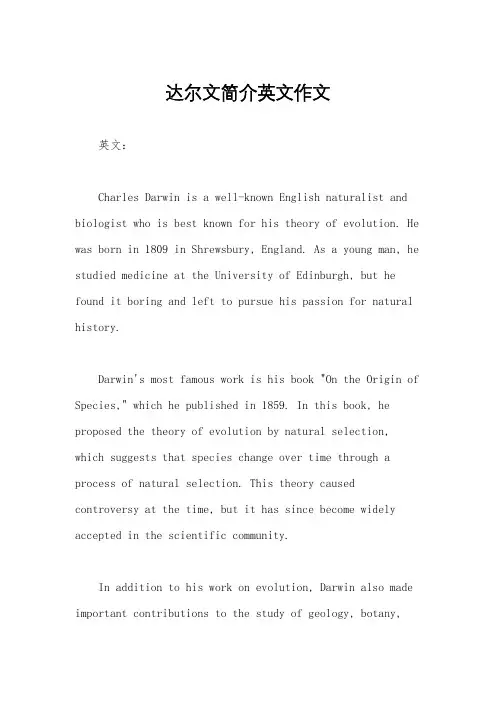
达尔文简介英文作文英文:Charles Darwin is a well-known English naturalist and biologist who is best known for his theory of evolution. He was born in 1809 in Shrewsbury, England. As a young man, he studied medicine at the University of Edinburgh, but he found it boring and left to pursue his passion for natural history.Darwin's most famous work is his book "On the Origin of Species," which he published in 1859. In this book, he proposed the theory of evolution by natural selection, which suggests that species change over time through a process of natural selection. This theory caused controversy at the time, but it has since become widely accepted in the scientific community.In addition to his work on evolution, Darwin also made important contributions to the study of geology, botany,and zoology. He was a prolific writer and published many books and articles throughout his career.One of the things I admire most about Darwin is his curiosity and his willingness to challenge conventional thinking. He was not afraid to question the prevailing ideas of his time and to explore new areas of knowledge. This is something that I try to emulate in my own life and work.中文:查尔斯·达尔文是一位著名的英国自然学家和生物学家,以他的进化论理论而闻名。
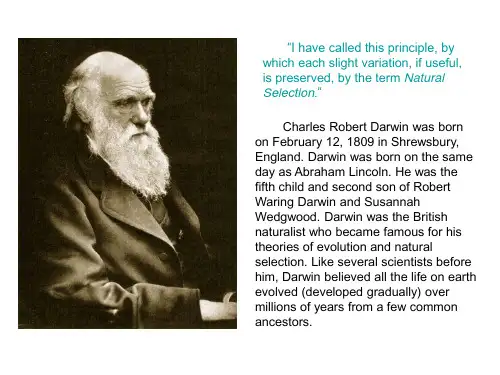
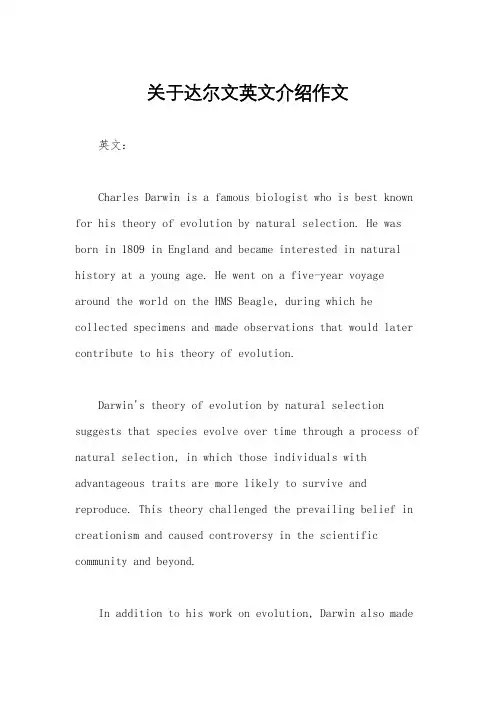
关于达尔文英文介绍作文英文:Charles Darwin is a famous biologist who is best known for his theory of evolution by natural selection. He was born in 1809 in England and became interested in natural history at a young age. He went on a five-year voyage around the world on the HMS Beagle, during which he collected specimens and made observations that would later contribute to his theory of evolution.Darwin's theory of evolution by natural selection suggests that species evolve over time through a process of natural selection, in which those individuals with advantageous traits are more likely to survive and reproduce. This theory challenged the prevailing belief in creationism and caused controversy in the scientific community and beyond.In addition to his work on evolution, Darwin also madeimportant contributions to the study of botany, geology,and zoology. He published many books, including "On the Origin of Species," which is considered one of the most important scientific works of all time.Darwin's legacy continues to influence biology andother fields of science today. His work has led to agreater understanding of the diversity of life on Earth and the processes that shape it.中文:查尔斯·达尔文是一位著名的生物学家,他以他的自然选择进化理论而闻名。
达尔文英文简介查尔斯·罗伯特·达尔文,英国生物学家,进化论的奠基人,摧毁了各种唯心的神造论以及物种不变论,下面是店铺给大家整理的达尔文英文简介,供大家参阅!查尔斯·罗伯特·达尔文简介Charles Robert Darwin, February 12, 1809 - April 19, 1882), British biologist, founder of evolution. Has been riding the Berger ship for 5 years of global voyage, animal and plant and geological structure, such as a large number of observation and collection. Published the "origin of species", put forward the theory of biological evolution, which destroyed a variety of idealistic gods and species invariance theory. In addition to biology, his theory of anthropology, psychology, philosophy development can not be ignored. Engels ranked "evolutionism" as one of the three discoveries of the natural sciences of the 19th century (the other two are the theories of cytology, conservation of energy) and have an outstanding contribution to mankind.On April 19, 1882, Darwin died at the village of Dawen at 73 years old and was buried in Westminster Abbey.查尔斯·罗伯特·达尔文成就Darwin himself said, "The main fun and the only thing I have in my life is my scientific work, and some of the most important scientific achievements that have been studied directly in the trip." For example, the famous " Study diary "and" Berger geology "," Berger's zoology "and so on. In his writings, the significance of "the origin of species", which is of particular historical significance, shows the progressive development of Darwin's theory of evolution and the theory of natural selection. The publication of the "origin of species" is a world event,because the publication of the "origin of species" marks the deepest view of the vast majority of learned people in the nineteenth century about the position of the biology and human beings in the biological world The change. The publication of the "origin of species" has led to the violent attacks on the Darwinian doctrines of the scientists and the telepathic scientists (who are the overwhelming majority), and have also led to the corresponding struggle to maintain Darwinism and actively participate in this There was a progressive naturalist in addition to the Darwinese, who had been a strong supporter of Darwinism everywhere.查尔斯·罗伯特·达尔文创立进化论After graduating from Cambridge University in 1831, his teacher Henslow recommended him as a "naturalist" identity to participate in the same year on December 27 British Navy "beagle" ship around the world scientific expedition sailing. First in the South America on the east coast of Brazil, Argentina and other places and the west coast and adjacent islands on the inspection, and then across the Pacific Ocean to Oceania, and then across the Indian Ocean to South Africa, and then around the Cape Atlantic by the Atlantic back to Brazil, and finally in October 1836 Day back to England. When he traveled around the world with the Beagle, he carried a few birds, and in order to feed the birds, he planted a grass called grass. The cabin was dark and only the windows were transmitted into the sun, and Darwin noticed that the grass seedlings were bent and grown in the direction of the window. But in the last few decades, Darwin was busy creating the theory of evolution until his later years before proceeding with a series of experimental studies on the issue of light, which was summed up in the book "Plant Movement"published in 1880. Darwin is using the seeds of grass to do these experiments. When the seeds of the grass germinate, the germs are covered with a layer of coleoptile, and the germs are first ground and the germs are protected from damage when they are unearthed. Darwin found that the coleoptile was the key to light. If the seeds are planted in the dark, their coleoptiles will grow vertically upwards. If the sun shines from one side of the seedlings, the sheath is bent in the direction of the sun. If the tip of the sheath is cut off, or covered with opaque things, although the light can also shoot the sheath, the sheath is no longer bending to the light. If the coleoptile is covered with transparent things, the coleoptile is bent toward the light, and even if the sheath is buried with opaque black sand, leaving only the tip, the buried sheath is still bent toward the light. Darwin speculates that a signal substance is secreted at the tip of the coleoptile and is transported down to the curved part, which causes the sheath to bend the sheath.The sailing changed the life of Darwin. After returning to England, he has been busy studying, determined to become a serious scientist to promote evolution. In 1838, he accidentally read T. Malthus's "theory of population", inspired by it, more certain that he is developing a very important idea: the world is not created within a week, the earth is older than the "Bible" Most of the animals and plants are changed, and still continue to change among the human, may be changed from a primitive animal, that is, Adam and Eve story is simply myth. Darwin realized that the survival struggle in the meaning of biological life, and realized that natural conditions is necessary for biological evolution of the "choice", the specific natural conditions are different, the choice is different, the choice of theresults are not the same.However, he was extremely cautious about the results of his research. In 1842, he began to write an outline, after which it extended to several articles. In 1858, Darwin decided to submit the Wallace article and his own part of the manuscript to the professional committee, in the light of the creative epiphany of the young naturalist R. Wallace. In 1859, "the origin of species,"a book came out, the first edition of 1250 that day sold out. After Darwin spent twenty years collecting information to enrich his species through the natural selection of the theory of evolution, and elaborate its consequences and significance.As a non-fist but creative man, Darwin avoided the controversy over his theory. Darwin wrote several books for scientists and psychologists when religious fanatical attack evolution was contrary to the creation of the Bible. The book "The Origin and Sex of Mankind" reports evidence of the evolution of mankind from the lower form of life, the evidence of the similarity of animal and human mental processes, and the evidence of natural selection in the evolutionary process.On April 19, 1882, the great scientist died of illness, and his body was buried at the tomb of Newton to express his admiration for the scientist.。
达尔文简介英文作文下载温馨提示:该文档是我店铺精心编制而成,希望大家下载以后,能够帮助大家解决实际的问题。
文档下载后可定制随意修改,请根据实际需要进行相应的调整和使用,谢谢!并且,本店铺为大家提供各种各样类型的实用资料,如教育随笔、日记赏析、句子摘抄、古诗大全、经典美文、话题作文、工作总结、词语解析、文案摘录、其他资料等等,如想了解不同资料格式和写法,敬请关注!Download tips: This document is carefully compiled by theeditor. I hope that after you download them,they can help yousolve practical problems. The document can be customized andmodified after downloading,please adjust and use it according toactual needs, thank you!In addition, our shop provides you with various types ofpractical materials,such as educational essays, diaryappreciation,sentence excerpts,ancient poems,classic articles,topic composition,work summary,word parsing,copyexcerpts,other materials and so on,want to know different data formats andwriting methods,please pay attention!Charles Darwin, a British naturalist and biologist, is best known for his theory of evolution by natural selection. Born in 1809, Darwin embarked on a five-year voyage around the world on the HMS Beagle, during which he made numerous observations and collected specimens that would later contribute to his groundbreaking work.Darwin's theory of evolution revolutionized the way we understand the natural world and our place in it. His book "On the Origin of Species" presented evidence that all species of life have descended over time from common ancestors, and that the process of natural selection is the primary mechanism driving this evolution.In addition to his work on evolution, Darwin also made significant contributions to the field of geology, and his research on the formation of coral reefs and volcanicislands further solidified his reputation as a leading scientist of his time.Despite facing criticism and controversy, Darwin's ideas eventually gained widespread acceptance and have had a profound impact on fields ranging from biology and anthropology to psychology and philosophy.Darwin's legacy continues to inspire scientific research and exploration, and his work remains a cornerstone of modern biology. His influence extends far beyond the realm of science, shaping our understanding of the natural world and our own place within it.。
达尔文英文介绍Father of Modern Biology: Charles DarwinCharles(查尔斯)Darwin's whole life was changed by one lucky chance. In 1831, before he went on the voyage of the Beagle贝格尔号的航程, he was a very ordinary young man of twenty-two. No one in England—certainly not Darwin himself —had any idea of the future he had before him.His sister Caroline gave him his first lessons. He was both lazy and naughty(nouty顽皮的), and everyone was glad that he went away to school after his mother's death when he was eight.Charles soon became a keen collector. He collected anything that caught his interest: insects(昆虫类), seashells(贝壳), coins and interesting stones. He said later that his collection prepared him for his work as a naturalist.He was not a very clever boy, but Charles was good at doing the things that interested him. He also took pleasure in carrying out experiments. But he could not learn Latin and Greek which in those days was an important part of education. He was a disappointment to his father, who was sure that he would bring nothing but shame to himself and his family.In 1825, when Charles was sixteen, his father sent him to Edinburgh(爱丁堡re)to study medicine, saying :“As you like natural history so much, perhaps we can make a doctor of you.”But Charles found the lectures boring, and the dissections(剥离) frightening. But at Edinburgh ,he was able to go to natural history lectures. In 1826 he read a paper on sea-worms海船蛀虫to the Natural History Society. This paper was his first known work on this subject.Then his father decided to send Charles to CambridgeUnivers ity to study to become a priest.(牧师) With hard work, he did quite well. And, in the countryside around Cambridge, he was able to shoot, fish and collect insects.He seemed likely to become a country priest like hundreds of others, sharing his time betwee n his work and his interest in natural history and country life. He had a deep faith in God and a lasting interest in religion. At this time he did not doubt that every word of the Bible (圣经)was true.Then a letter from Captain Robert Fitzroy菲茨罗伊changed his life. Fitzroy was planning to make a voyage around the world on a ship called the Beagle. He wanted a naturalist to join the ship, and Darwin was recommended. That voyage was the start of Charles Darwin's great life work.In those days a great many people believed that every word written in the Bible was true. Darwin hoped that the plants and animals that they found in the course of their voyage would prove the truth of the Bible story of the great Flood.He began to observe everything. When they got to Rio de Janeiro里约热内卢in South America, Charles was overcome with joy to see so many different creatures, so much life and color. His notebooks were full of detailed observations(观察值).Then they reached dry land at Punta Alta. There Darwin discovered his first fossils(fosoo化石). Why, he wondered, were there horse bones at Punta Alta, when there had been no horses in the New World until Cortez科尔特斯brought his from Spain(西班牙sban)They came to Tierra del Fuego火地岛at the tip of South America. It was a strange place, with terrible storms. Its people grew no food, and they slept on the wet ground. Darwin observed their looks and habits.“How can people be so d ifferent, if all are descended(从一个祖先传下来的) from Adam and Eve in the Garden of Eden伊甸园?” Charles w ondered.A trip into the mountains showed Darwin seashells at a height of 12,000 feet. Lower down were fossil trees.“So those trees once stood by the sea,” thought Darwin. “The sea came up and covered them. Then the sea-bed rose up...” To a man who had been taught that every word in the Bible was true, this was very puzzling(费解的).In Chile(智利, where Darwin saw earthquakes and volcanoes 火山wo ka no), he began to see what must have happened. The centre of the earth, he decided, was very hot. The surface of the earth was thinner稀释剂in some places. It was in these places that earthquakes and volcanoes developed.As the Beagle sailed around the world, Darwin began to wonder how life had developed on earth. He saw volcanic islands in the sea, and wondered how living things had got there.But people who believed every word of the Bible thought that God had made all creatures and Man. But, if that was true, why did some of the fossils look like “mistakes” which had failed to change and, for that reason, died out?On went Beagle, to Tahiti塔西提岛, New Zealand and Australia. There, Darwin saw coral 珊瑚(callroll)and coral islands for the first time. How had these islands come about? Soon, he had the answer. Coral was made up of the bodies of millions of tiny creatures, piled (paie )up堆积over millions of years —a million years for each island. Darwin wrote it all down in his notebooks.After five years he was home. He was never again the healthy young man who climbed mountains and carried heavy bags offossils for miles.He set to work, getting his collection in order. And, in 1839, he married his cousin, Emma Wedgwood. It was a happy marriage with ten children. He could be found working in his study, with a child beside him.His first great work The Zoology动物学of the Beagle was well received, but he was slow to make public his ideas on the origins of life. He was certainly very worried about disagreeing with the accepted views of the Church.Happily, the naturalists at Cambridge persuaded说服(pesiwayde) Darwin that he must make his ideas public. So Darwin and Wallace华莱士, another naturalist who had the same opinions as Darwin, produced a paper together. A year later,Darwin's great book, On the Origin of Species by Means of Natural Selection appeared. It attracted a storm.People thought that Darwin was saying they were descended from monkeys. What a shameful idea! Although most scientists agreed that Darwin was right and that the story of Adam and Eve was merely a story, the Church was still so strong that Darwin never received any honors for his work.Many years later, he published his other great work, The Descent下降of Man. He gave a lecture at the Royal Institution习俗, when the whole audience stood up and clapped.His health grew worse, but still he worked. “When I have to give up observation, I shall die,” he said. He was still working on 17, April, 1882. He was dead two days later.。